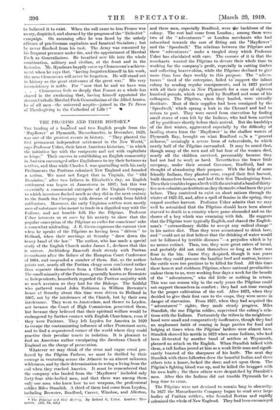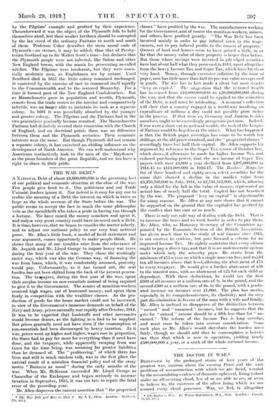THE PILGRIMS AND THEIR HISTORY.*
THE landing of a buided and two English people from the `Mayflower' at Plymouth, Massachusetts, in December, 1620, was one of the greatest events in history. " They planted the first permanent independent settlement in the New World," says Professor Usher, their latest American historian, in which the initiative lay with the emigrants and not with capitalists or kings." Their success in establishing an English community in America encouraged other Englishmen to try their fortunes as settlers, and thus while Charles I. was quarrelling with his early Parliaments the Puritans colonized New England and founded a nation. We must not forget that in Virginia, the "Old Dominion,". after two failures in Elizabeth's day, an English settlement was begun nt Jamestown in 1607; but this was essentially a commercial enterprise of the Virginia Company, to which investors flocked much as they did in the next century to the South Sea Company with dreams of wealth from fabled gold-mines. Moreover, the early Virginian settlers were mostly men of substance who meant to trade in a dignified way with the Indians, and not humble folk like the Pilgrims. Professor Usher interests us at once by his anxiety to show that the popular conception of the Pilgrims as exiles for conscience' sake is somewhat misleading. J. It. Green expresses the current view when Ile speaks of the Pilgrims as having been " driven " to Ilelland, when their meetings at Scrooby "drew down the heavy hand of the law." The author, who has made a special study of the English Church under James I., declares that this is untrue. Archbishop Bancroft dealt sternly with Puritan incumbents after the failure of the Hampton Court Conference of 1604, and suspended a number of them. But, as the author points out, nearly all the Puritan clergy soon conformed rather than separate themselves from a Church which they loved. The small minority of the Puritans, generally known as Brownista or Independents, henceforth regarded the Puritan majority with as nmeh aversion as they lied for the Bishops. The faithful who gathered round John Robinson in William Brewster's house at Serooby about this time were driven to Holland in 1607, not by the intolerance of the Church, but by their own intolerance. They went to Amsterdam, and thence to Leyden, not because the Court of High Commission persecuted them, but because they believed that their spiritual welfare would be endangered by further contact with English Churchmen, even if they were Puritans. They left Leyden for America in 1620 to escape the contaminating influence of other Protestant sects, and to find a sequestered corner of the world where they could practise their peculiar tenets in isolation. It is pleasant to find an American author exculpating the Jacobean Church of England on the charge of persecution.
Whatever we may think of the stern and vague creed pro- fessed by the Pilgrim Fathers, we must be thrilled by their courage in venturing across the Atlantic to an almost unknown wilderness, and by their determination to wring a living from the soil when they reached America. It must be remembered that the company who landed from the ' Mayflower' included only forty-four able-bodied men, and that there was among them only one man who knew how to use weapons, the professional soldier Miles Standish. A third of them had come from Leyden, including Brewster, Bradford, Carver, Winslow, and Allerton,
• Ste Tddrina and their Histcry. By Boland 0, Usher. London : Met, cassias. (lac eu. wt.) and these men, especially Bradford, were the backbone of the colony. The rest had come from London ; among them were two of the " adventurers " or London merchants who had subscribed towards the cost of fitting out the 'Mayflower' and the ' Speedwell.' The relations between the Pilgrims and these " adventurers" make a tangled story which Professor Usher has elucidated with care. The essence of it is that the merchants wanted the Pilgrims to devote their whole time to working for the company's profit, especially in cutting timber and collecting beaver-skins, while the Pilgrims declined to give more than four days weekly to this purpose. The " adven- turers" tired of the enterprise, failed to 'support the infant colony by sending regular consignments, and in 1627 parted with all their rights in New Plymouth for a sum of eighteen hundred pounds, which was paid by Bradford and some of his colleagues. The Pilgrims, when they landed, were virtually destitute. Most of their supplies had been consigned by the Speedwell,' which sprang a leak in the Channel and had to return to port. They were saved from starvation by finding small stores of corn left by the Indians, who had been carried off by pestilence shortly before their arrival. But the hardships of the first winter, aggravated especially by the difficulty of landing stores from the `Mayflower' in the shallow waters of Plymouth Bay, brought on what Bradford es:Is a "general sickness," seemingly a severe form of tuberculosis, to which nearly half of the Pilgrims succumbed. It may be noted that, though many of the men and all but four of the women died, nearly all the children survived, presumably because they had not had to work so hard. Nevertheless the brave little company, under their second Governor, Bradford, had no thought of abandoning their purpose. With the help of some friendly Indians, they planted Corn, reaped their first harvest, built themselves houses, and had their first Thanksgiving feast. Then their t roubles began afresh with the arrival of a band of thirty- five new colonists,as destitute as they themselves had been the year before. They contrived to exist on short rations through the winter of 1621.22, and, after a spell of famine in the spring, they reaped another harvest. Professor Usher admits that we may well be astonished that the Pilgrims should have been almost starved to death in a country where game abounded and on the shores of a bay which was swarming with fish. He suggests that the. Pilgrims were typically English, and shared the English- man's " extraordinary dislike to accept any radical change" in his native diet. Thus they were accustomed to drink beer, and " could not at first believe that the drinking of water would not be followed by terrible diseases "—a prejudice which is by no means extinct. Then, too, they were great eaters of bread, and probably did not stint themselves so long as there was flour in the bin. Game they despised, though it was years before they could procure the familiar beef and mutton, because the cattle were too precious to be killed for food. All this time these honest and stubborn Pilgrims, whose national peculiarities endear them to us, were working four days a week for the benefit of the "adventurers," who did little or nothing in return. This was one reason why in the early years the Pilgrims could not support themselves in comfort ; they had not time enough for the proper cultivation of the soil. After 1623, when they decided to give their first care to the crops, they were never in danger of starvation. From 1627, when they had acquired the " adventurers' " rights, they made steady progress. Miles Standish, the one Pilgrim soldier, supervised the colony's rela- tions with the Indians. Fortunately the tribes in the neighbour- hood were small and comparatively inoffensive, though they had an unpleasant habit of coming in large parties for food and lodging at times when the Pilgrims' larders were almost bare. Standish showed his mettle in 1623 when some Indiana, who had been ill-treated by another band of settlers at Weymouth, planned an attack on the English. When Standish talked with them, a tall Indian jeered at him as a weak little man and signifi- cantly boasted of the sharpness of his knife. The next day Standish, with three followbes drew the boastful Indian and three others into a house, locked the door, and set upon them. The Pilgrim's fighting blood. was np, and he killed the braggart with his own knife ; the three others were despatched by Standish's men. After this the Indians did not trouble Plymouth for a long time to come.
The Pilgrims were not destined to remain long in obscurity. In 1627 the Massachusetts Company began to send over large bodies of Puritan settlers, who founded Boston and rapidly colonized the whole of New England. They had been encouraged
by the Pilgrims' example and profited by their experience. Thenceforward it was the object of the Plymouth folk to hold themselves aloof, lest their weaker brethren should be corrupted by the lax creed of the ordinary Puritans to north and south of them. Professor Usher describes the stern moral code of Plymouth—no sterner, it may be added, than that of Presby- terian Scotland up to Sir Walter Scott's time—but declares that the Plymouth people were not infected, like Salem and other New England towns, with the mania for persecuting so-called witches. The Pilgrims were intolerant, but they were essen- tially moderate men, as Englishmen arc by nature. Until Bradford died in 1657 the little colony remained unchanged. It contrived by the exercise of tact to commend itself equally to the Commonwealth and to the restored Monarchy. For a time it formed part of the New England Confederation. But as Massachusetts grew in population and wealth, Plymouth, remote from the trade routes to the interior and comparatively infertile, was no longer able to maintain its rank as a separate colony. In 1691 it was peacefully absorbed by the younger and greater colony. The Pilgrims and the Puritans had in the two generations gradually- become reunited. The Massachusetts Puritans had definitely severed their connexion with the Church of England, and on doctrinal points there was no difference between them and the Plymouth sectaries. Their economic interests were the same. But though Plymouth did not remain a separate colony, it has exercised an abiding influence on the development of North America. We can well understand why Americans instinctively look to the men of the ' Mayflower ' as the pious founders of the great Republic, and we too have a right to share in their pride.



































 Previous page
Previous page